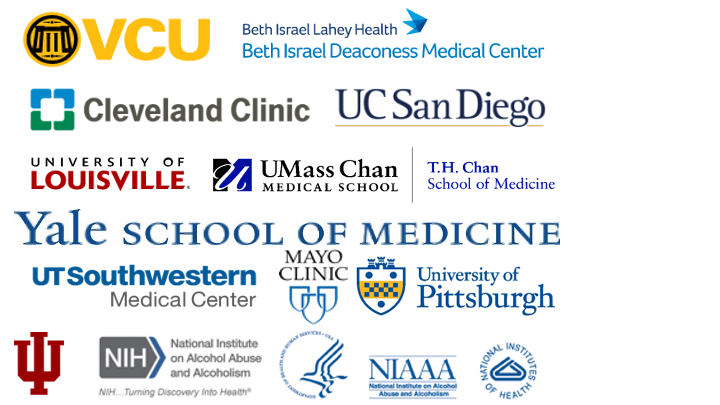AlcHepNet Clinical Trial Eligibility and Enrollment
Please note that recruitment is closed.
- AH, as defined by the NIAAA pan-consortia for AH:
- Onset of jaundice (defined as serum total bilirubin >3 mg/dL) within the prior 8 weeks to screening visit
- Regular consumption of alcohol with an intake of > 40 gm daily or >280gm weekly on average for women and > 60 gm daily or >420gm weekly on average for men for 6 months or more, with less than 8 weeks of abstinence before onset of jaundice
- AST > 50 IU/l
- AST:ALT > 1.5 and both values < 400 IU/l
- and/or histological evidence of AH*
- MELD 20-35 on day of randomization.
- Age ≥ 21
* In patients with possible AH or AH with confounding factors such as possible ischemic hepatitis, possible DILI, uncertain history of alcohol use (e.g., patient denies excessive alcohol use), and atypical/abnormal laboratory tests (e.g., AST < 50 IU/mL or > 400 IU/mL, AST/ALT ratio < 1.5), antinuclear antibody > 1:160 or SMA > 1:80, a liver biopsy will be performed to confirm AH and exclude competing etiologies
- MELD SCORE <20 or > 35
- Active sepsis (positive blood or ascitic cultures) with Systemic Inflammatory Response Syndrome (SIRS) or hemodynamic compromise requiring intravenous pressors to maintain tissue perfusion
- Pneumonia as evidenced by radiological exam
- Multi-organ failure
- Renal failure defined by GFR < 35 mL/min.
- Clinically active C. diff infection
- History of imaging of the liver (ultrasound, computerized tomography or magnetic resonance) showing other causes of jaundice
- History of other liver diseases including hepatitis B (positive HBsAg or HBV DNA), hepatitis C (positive HCV RNA), autoimmune hepatitis, Wilson disease, genetic \hemochromatosis, alpha1-antitrypsin deficiency or strong suspicion of Drug Induced Liver Injury (DILI). Previously treated hepatitis C that was cured (sustained virological response with negative RNA ≥24 weeks following treatment) is not an exclusion.
- History of HIV infection (positive HIV RNA or on treatment for HIV infection)
- History or presence of cancer (including hepatocellular carcinoma) other than non-melanoma skin cancer
- History of other significant medical problems such as autoimmune diseases, severe asthma, psoriasis, Inflammatory Bowel Disease (IBD), etc. that might require immunosuppressive treatments
- Pregnancy or breastfeeding
- Prior exposure to experimental therapies in last 3 months
- Prior exposure to systemic corticosteroid (glucocorticoid) or immunosuppressive therapy for more than 4 days within previous 30 days
- Need for inotropic pressor support to maintain perfusion to critical organs within prior 48 hours before randomization and initiation of experimental treatment
- Clinically significant pancreatitis- abdominal pain, elevated lipase (> 3 X ULN) and at least edema of pancreas with fat-stranding on CT scan
- Total WBC count > 30,000/mm3
- Known allergy or intolerance to therapeutic agents to be tested
- Inability to voluntarily obtain informed consent from participant or guardian
- Perceived inability to follow study procedures and comply with protocol
- Platelet count < 40,000 k/cumm.
- Positive PCR test for COVID-19 within 7 days prior to baseline day 0 visit*
- Active gastrointestinal bleeding defined as hematemesis or melena with a decrease in hemoglobin more than 2 g/dl in 24 hrs. Due to gastrointestinal bleeding, or with a decrease in mean arterial BP to < 65 mmHg
*Positive PCR test for COVID-19 is exclusionary only during the screening period. If a patient tests positive any time after baseline randomization, a positive PCR test for COVID-19 will be considered as a SAE.
The participants for this study will be recruited from a hospitalized population of participants meeting the eligibility criteria outlined above who live within one day travel from one of the participating clinical centers and who have provided informed consent to participate in this clinical trial and who are willing to continue their participation for the anticipated follow-up period of the trial. Although the primary endpoint is survival at 90 days, follow-up visits will be continued up to 6 months.
AlcHepNet Organizations

AlcHepNet is a clinical and translational research initiative funded by the National Institute on Alcohol Abuse and Alcoholism (NIAAA), a division of NIH.